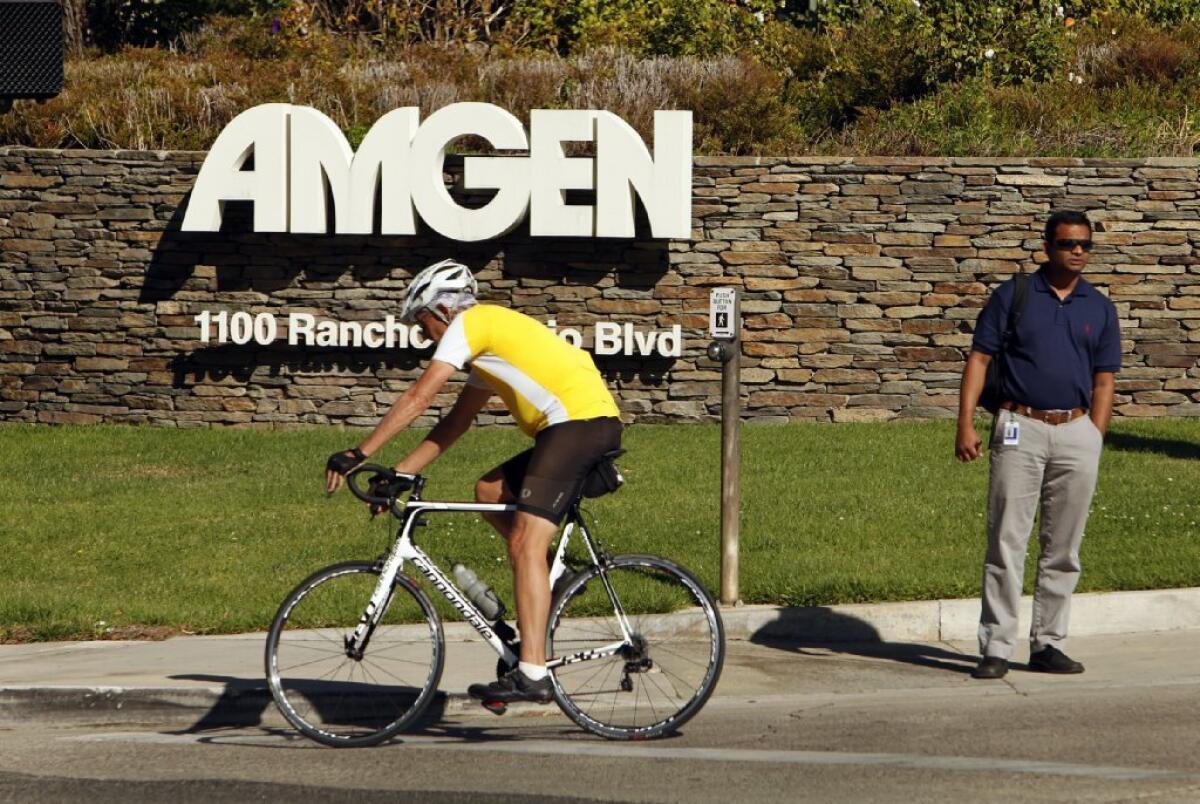Prescription firm agrees to cover pricey new cholesterol drugs -- for some

Amgen Inc. of Thousand Oaks, one of the nation’s largest biotech companies, makes cholesterol drug Repatha.
- Share via
The nation’s largest pharmacy benefits manager said it would cover two pricey new cholesterol drugs, including one by Amgen Inc., but limit them to patients who need them most.
Express Scripts Inc., a St. Louis company that helps employers and health plans manage the costs of prescription drugs, said Tuesday that it had reached a deal to cover Repatha by Amgen and Praluent by Sanofi and Regeneron Pharmaceuticals Inc. at a discount from their suggested retail price.
Both drugs were recently approved by the Food and Drug Administration and represent the first significant breakthrough in the treatment of high LDL, the “bad” cholesterol, in more than 20 years.
SIGN UP for the free California Inc. business newsletter >>
But in addition to their promise, the drugs carried a suggested price of more than $14,000 a year — 140 times more expensive than statins, the most common cholesterol-fighting medication. The pricing had drawn widespread criticism, with one study concluding the true value of the drugs is a fraction of their sticker price.
The new drugs hit the market amid a fierce debate between insurers and pharmaceutical companies about the appropriate pricing of specialty drugs, which treat smaller patient populations but can come with price tags significantly higher than older medications.
Express Scripts would not say how much of a discount it had negotiated with the drug companies, but said it expects to spend about $750 million on the new class of drugs next
year, which it said was “far less” than industry expectations.
Express Scripts’ decision to pay for the drugs marked an important step for both companies. Eric Schmidt, a biotech analyst with investment bank Cowen & Co. in New York, said he expected the benefits manager to pay for the drugs.
“Express Scripts probably had little choice but to cover it. Nonetheless, this is welcome news as Express Scripts has been yapping on about how expensive the drug is, this despite the fact that it will almost surely save many lives,” he said.
Amgen, a biotech giant with headquarters in Thousand Oaks, said in a statement that the company’s decision will ensure that patients who do not respond to statins can have their high cholesterol treated.
“Ensuring access to Repatha for appropriate patients is among Amgen’s highest priorities,” said Anthony C. Hooper, who oversees Amgen’s global commercial operations. “We will continue to engage constructively with other payers to enable patients to have access to Repatha.”
Pharmaceutical partners Regeneron and Sanofi said in a statement that they hope the agreement with Express Scripts will lead to establishing agreements with other insurers.
The injected drugs improve the liver’s ability to reduce LDL, which has been tied to increased risk of heart attack and stroke. The drugs are self-injected and work by blocking a protein, called PCSK9, that interferes with the liver’s ability to remove cholesterol. Statins work by limiting the liver’s ability to make cholesterol.
An estimated 70 million people in the United States have high cholesterol, and Express Scripts has previously estimated that as many as 10 million Americans might benefit from the new drugs.
Marcus Thygeson, chief health officer for Blue Cross of California, told The Times this year that the drugs were priced “way above their health value.”
He said the pricing was even more troublesome than hepatitis C drugs from Gilead Sciences, which can cost nearly $100,000 per patient. That’s because so many more people have high cholesterol and it is a chronic condition typically requiring treatment throughout a patient’s lifetime.
Express Scripts said Tuesday that it would limit coverage to those patients who most need them,
“minimizing unnecessary risks and wasteful spending.”
“For the large majority of the more than 70 million people with high cholesterol, statins are the clinically appropriate, tried-and-true therapy,” it said.
Another concern, Express Scripts said, is that no studies have been completed to show whether the drugs reduce heart attacks and strokes. Such studies are underway.
“Little has been proven about the long-term effect of lowering LDL in this manner,” the company said. “For both patient safety and payer affordability, it is important to ensure this class of drugs is appropriately managed.”
The Harvard-affiliated Institute for Clinical and Economic Review issued a report this year that said the true value of the drugs is $3,600 to $4,800 a year, about one-third of their list price. The pricing would need to be even lower — about $2,200 — for insurers to be able to afford to cover them.
Twitter: @spfeifer22
ALSO:
VW to angry owners: Want cash to buy another one?
The reinvention of Peeple, an app that doesn’t even exist yet
American Apparel hangs on to its made-in-America model — by a thread
More to Read
Inside the business of entertainment
The Wide Shot brings you news, analysis and insights on everything from streaming wars to production — and what it all means for the future.
You may occasionally receive promotional content from the Los Angeles Times.









